Would you like to know the impact and use of AI in SEO?
AI is fast becoming a hot topic in SEO. It’s helping many digital marketers and small business owners execute SEO tasks quicker and more efficiently.
In this article, we’ll look at the role of AI in SEO and some considerations to make as you embrace AI in your SEO strategy.
Understanding AI and SEO
To best understand AI in SEO, let’s briefly examine these two acronyms.
Artificial intelligence (AI) is an umbrella term that covers several different technologies, including machine learning (ML), natural language processing (NLP), deep learning, computer vision, and other emerging technologies. These technologies are designed to help machines perform specific cognitive tasks as well as, or better than, humans.
On the other hand, search engine optimization (SEO) enhances your website and web pages to drive organic traffic from search engines like Google. If you follow WordPress SEO best practices on your site, search engines quickly discover your content and display it in the search results.
Therefore, AI in SEO uses AI technology to optimize your website and content for search engines and users. Doing so helps you easily scale your SEO campaigns and execute tasks faster and more efficiently. As a result, your chances of ranking high on search engine results pages (SERPs) are bolstered.
AI in SEO Has Been Around Longer than You Think
AI has been a part of SEO for years. In fact, search engines like Google have been integrating AI in their algorithms to determine how to rank content since the RankBrain update in 2015. With the introduction of Google’s BARD and the evolution of Google’s search generative experience (SGE), AI will soon have a prominent role in SEO.
The recent shifts in the capabilities of AI have catapulted AI SEO tools into the future. Because of this, the way SEO tasks are performed has greatly changed. That’s because AI can help you with many tasks, including:
This brings us to one of the latest developments in AI for SEO: ChatGPT.
What is ChatGPT (And How has it Revolutionized AI in SEO)?
ChatGPT is an artificial intelligence (AI) chatbot developed by OpenAI, an AI research company. Released in November 2022, this revolutionary tool can help you with:
- Carrying out conversations
- Writing articles, academic essays, and emails
- Writing code
- And much more
Because of its powerful capabilities, ChatGPT has already gained over 100 million active users and has become a hot topic in every industry, particularly in digital marketing circles.
Today, ChatGPT has revolutionized the way AI is used in SEO. For one, many SEO plugins are now being built on the ChatGPT platform, and many others are incorporating it to make them more powerful. Because of this, many marketers and SEOs are using AI-powered SEO tools and software to gain an edge over their competitors.
SEO for AI Search Engines (Generative Engine Optimization)
With the rise of AI search engines like Google’s SGE, Perplexity.ai, BingChat, and more, we’re seeing a rapid shift in SEO. Of particular note is the rise of generative engine optimization (GEO).
GEO mainly focuses on aligning your content with the requirements of generative AI engines. These engines use advanced algorithms to generate detailed, context-rich responses rather than merely listing links.

The goal of GEO is to ensure your content is not only discoverable but also valuable and relevant when AI synthesizes information for user queries.
GEO vs. SEO: What’s the Difference?
Generative Engine Optimization (GEO) and Search Engine Optimization (SEO) are two distinct approaches aimed at enhancing online visibility, but they cater to different technologies and methodologies. Understanding their differences is crucial for anyone looking to optimize digital content effectively. Let’s briefly look at their main differences.
1. Focus of Optimization
- SEO: Traditional SEO primarily targets human users and conventional search engines like Google and Bing. It emphasizes improving rankings on SERPs through keyword optimization, backlinking, and technical elements like performance.
- GEO: In contrast, GEO focuses on optimizing content for AI-driven generative engines. The goal is to ensure that content is structured so AI can easily interpret it into coherent responses to user queries.
2. Techniques Employed
- SEO techniques: SEO strategies often involve traditional ranking factors like keyword research and placement, backlink building, and enhancing user experience metrics like click-through rates and dwell time. The objective is to rank higher in SERPs by matching user searches with relevant content.
- GEO techniques: GEO emphasizes content quality, relevance, and structure over specific keyword density. It utilizes clear headings, bullet points, and well-organized information to facilitate AI’s ability to extract and summarize data effectively. This means creating content that answers questions directly and can be easily integrated into AI-generated responses.
GEO vs. SEO: What Does this Shift Mean for You?
Because AI is increasingly becoming the “first stop” for many consumers! People are asking tools like ChatGPT to solve problems, provide advice, or even make purchasing decisions.
Now, imagine your content isn’t optimized to appear in these conversational AI answers. You’d be missing out on a massive slice of traffic!
So, how do you implement GEO?
Here’s where the fun starts!
To optimize content for generative engines, follow these strategies:
1. Focus on Question-based Content
Generative AI thrives on answering questions. Frame your content around common queries. For example:
- Traditional SEO: “Best Running Shoes in 2024”
- GEO: “What are the best running shoes for marathon training in 2024?”
By directly addressing questions, you align your content with the structure of AI-generated responses.
2. Create Conversational Content
Generative AI mimics human dialogue. If your content is written in a more conversational tone, AI is more likely to pull from it. Think “How-to” guides, FAQs, or even troubleshooting articles.
3. Break Up Content with Bucket Brigades
Keeping attention is key! Bucket brigades are short, curiosity-provoking phrases that hook readers and keep them engaged.
And guess what?
AI engines love clear, concise content, too!
Examples:
- “Here’s the kicker…”
- “Let me explain…”
- “The secret is…”
These phrases create natural stopping points that encourage deeper engagement, and AI can use them to break up responses into digestible chunks.
4. Optimize for Multi-step Processes
People often ask AI to walk them through steps. Structure content around these processes and label them clearly.
Example: A blog about fixing a car might be written as:
- Step 1: Diagnose the Problem
- Step 2: Get the Right Tools
- Step 3: Start with the Engine
5. Refresh content regularly
AI engines are constantly learning and updating. Keep your content fresh so it’s indexed by AI. Updated content has a higher chance of being selected by AI in its responses, which boosts traffic.
Generative Engine Optimization is the next frontier in content marketing. As AI continues to rise, staying ahead of the curve by adapting your strategy to these generative engines can unlock new opportunities for traffic, engagement, and conversions.
But with all the hype around AI, the question is: is it a fad or the future of SEO?
AI in SEO: 4 Things You Need to Know
Now that you know what AI is and what it’s used for in SEO, let’s look at some interesting use cases you can implement.
1. AI Offers Many Powerful SEO Tools
With the onset of using AI in SEO, AI has improved many SEO tools. An excellent example is All In One SEO (AIOSEO).


AIOSEO is a powerful yet easy-to-use SEO plugin that has been downloaded over 100 million times. Millions of smart bloggers use AIOSEO to help them boost their search engine rankings and drive qualified traffic to their blogs. That’s because the plugin has many powerful features and modules designed to help you properly configure your SEO settings. Examples include:
- Cornerstone Content: Easily build topic clusters and enhance your topical authority and semantic SEO strategy.
- Index Status: Check if your page or post has been indexed—right inside your WordPress dashboard.
- Search Statistics: This powerful Google Search Console integration lets you track your keyword rankings and see important SEO metrics with 1-click, and more.
- SEO Revisions: Track any changes you make to your site and see their impact on your SEO. Plus, you get to see on a timeline how Google updates affect your site.
- Advanced Robots.txt Generator: Easily generate and customize your robots.txt file for better crawling and indexing.
- TruSEO Highlighter: Makes it easy to spot on-page SEO issues and gives recommendations for fixing them.
- Next-gen Schema generator: This no-code schema generator enables users to generate and output any schema markup on your site.
- Redirection Manager: Helps you manage redirects and eliminate 404 errors, making it easier for search engines to crawl and index your site.
AIOSEO also has some SEO modules that are powered by AI, namely the AI Title/Description Generator and Link Assistant.
AI Title/Description Generator
AIOSEO’s AI Title/Description Generator helps take the labor out of crafting post titles and meta descriptions as it automatically does this at a click of a button.
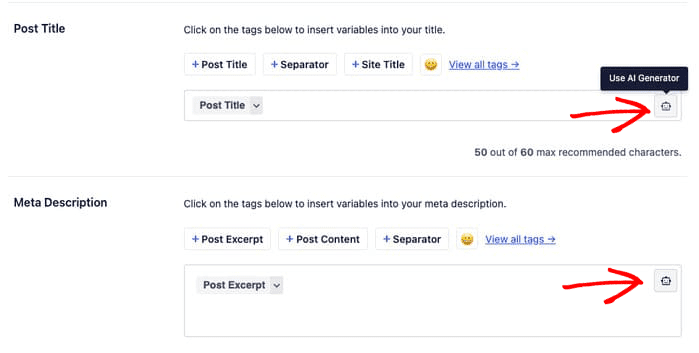

The AI engine then creates 5 suggestions based on your content…
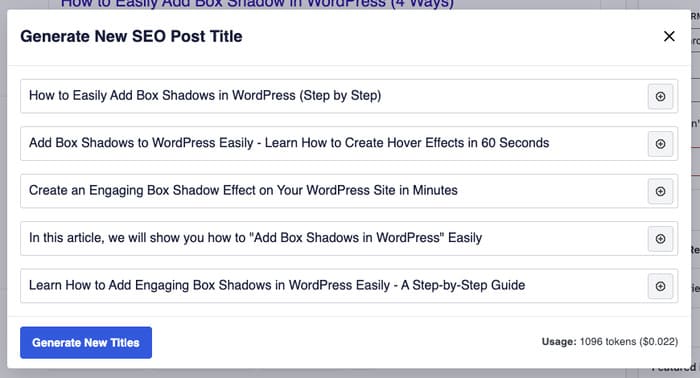

All you need to do is select the one you want and tweak it if necessary.
With optimized SEO post titles and meta descriptions, your content will:
- Rank higher on search engines
- Gain more visibility on SERPs
- Drive more traffic to your site
And all it takes to gain these results is a simple click of a button!
Link Assistant
Another AI-powered feature is Link Assistant, our internal link-building module.
Link Assistant automates internal link building by crawling your site to check for internal linking opportunities. The Overview shows you the number of external and internal links and the affiliate links on your site.
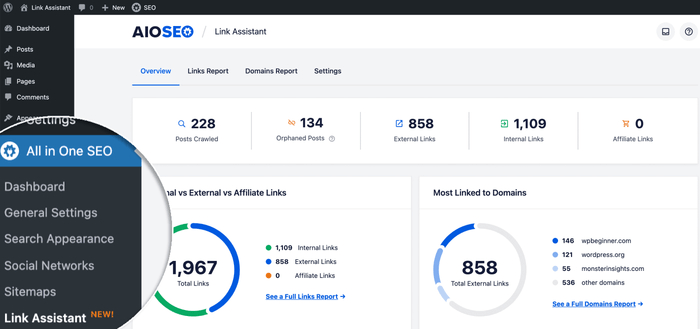

You can also get a more detailed report of the links on your site by clicking on the Links Report. It then gives you a report with Linking Suggestions and shows you the Orphan Posts on your site.
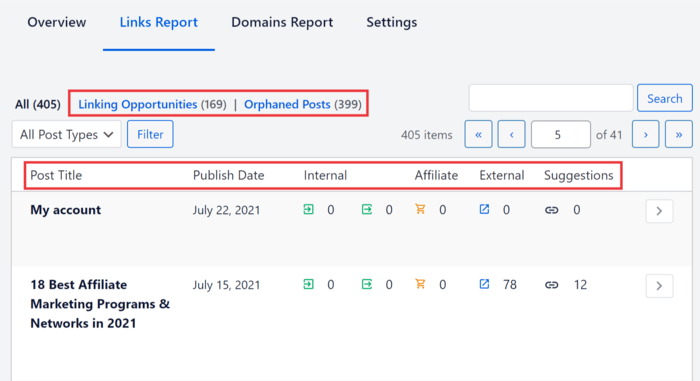

The best part is that you don’t have to open the target page to add the suggested links. Instead, open the Links Report and click on a post or page. Doing so will open a window with internal inbound and internal outbound link suggestions.
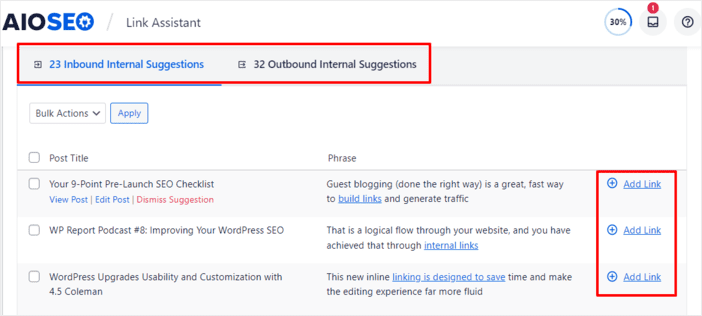

This level of automation just makes the internal linking process faster and more efficient.
If you’re looking for the best WordPress AI plugin, then look no further than AIOSEO. Because it’s an easy-to-use plugin, and you don’t need any coding or technical knowledge to use it to its full potential.
For step-by-step instructions on how to install AIOSEO, check out our installation guide.
Besides AIOSEO, many other SEO tools and plugins incorporate AI into their feature sets. Here’s a list of some of the best AI SEO tools for various SEO tasks.
2. AI is Not a Silver Bullet
Although AI is powerful, don’t get misled into thinking it will make you the number 1 listing on SERPs. That’s especially true in the case of content creation.
AI is a tool. And like all tools, no matter the industry, a tool is only as good as the person who uses it. You still need to know how to use the tools effectively.
That’s why you must not think AI will magically do all the work for you. For example, when getting AI to create content, you need to master the right prompts to help you get the most out of the tool. And even if you use the right prompts, you still need to go through the content to verify facts and ensure grammatical correctness.
This brings us to the next point.
3. Human-generated vs. AI-generated Content: Which Is Best for SEO?
While AI-powered content tools are becoming increasingly better at creating content, they still have one major flaw: they are just advanced article spinners. This means they are incapable of conducting their own research and providing opinions. Instead, they parse through content on the internet and create content based on that.
This is why your input is required when using AI to generate content.
So does AI-generated content really help or hurt your website’s visibility?
Well, let’s dive into the details!
AI-generated content refers to text, images, and videos created using tools like ChatGPT or DALL-E. These powerful technologies rely on machine learning algorithms trained on huge datasets. But here’s the catch: the quality of this content can vary widely. Sometimes, AI produces inaccurate or even nonsensical information. That’s why I always recommend double-checking anything AI generates before hitting “publish.” You don’t want to risk damaging your brand’s credibility or your SEO performance!
Besides inaccuracies, another factor to consider when using AI to generate content is whether the output meets Google’s E-E-A-T guidelines. FYI, E-E-A-T refers to Expertise, Experience, Authoritativeness, and Trustworthiness. While AI can churn out content quickly, it often lacks the personal touch and firsthand experience that only human authors can provide. This is crucial for establishing authority in search rankings. Google isn’t outright banning AI content, but they do caution against using it solely to game the system. If you’re not careful, you could end up violating their spam policies.
So, how can we use AI effectively for SEO?
Here’s my advice: think of these tools as your assistants rather than replacements for your creativity. By blending personal insights with AI-generated drafts, you can create high-quality content that resonates with your audience. For instance, use AI to brainstorm article ideas or create outlines but add your unique voice and expertise to the final piece. This way, you’ll produce engaging content faster while still improving your SEO outcomes! Are you ready to embrace the future of content creation?
For an in-depth look at this topic, check out — Is AI Content Bad for WordPress SEO?
4. The AI Revolution is Leading to the Rise of Answer Engine Optimization (AEO)
Answer engine optimization (AEO) is a subset of SEO that focuses on providing users with direct answers to their queries on search engines. It is often in the form of a featured snippet, knowledge panel, or AI assistants in search engines like Bing AI or Google SGE.
AEO aims to provide the most relevant and accurate answer to a user’s query and display it by search engines.
With search engines heavily relying on AI to rank content, SEO has moved away from being keyword-focused to search intent-focused. This means your SEO strategy should now focus on proving to search engines that your content and brand are relevant to users’ search queries. One way of doing this is to use FAQs in your content. This results in your search snippets being more prominent on SERPs.
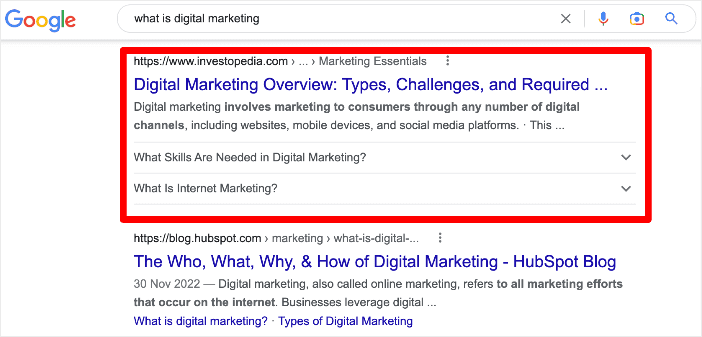

FAQs can also help boost your SEO and improve your organic clickthrough rates (CTR).
Another way of boosting your AEO is to build strategic internal links in your content. This is super easy with an AI-powered tool like Link Assistant. By building internal links, you build topical authority, and search engines will value your answers more, leading to higher search rankings.
AI in SEO: Your FAQs Answered
What is AI SEO?
AI SEO is the use of artificial intelligence (AI) to help boost your rankings and visibility on search engines.
Is AI taking over SEO?
While AI may be changing how SEO is done, it is in no way taking over SEO.
What is Generative Engine Optimization (GEO)?
Generative Engine Optimization (GEO) is a strategy focused on enhancing digital content to improve its visibility and effectiveness within AI-driven search engines.
AI in SEO: The Future is Here
AI is bringing so many positive benefits to SEOs and marketers. But if you’re a small business owner, you must understand what you get when using AI in your search strategy.
We hope this article helped you know what to expect with AI in SEO. You may also want to check out other articles on our blog, like our ultimate WordPress SEO guide or our guide to finding and fixing broken links in WordPress.
If you find this article helpful, then please subscribe to our YouTube Channel. You’ll find many more helpful tutorials there. You can also follow us on X (Twitter), LinkedIn, or Facebook to stay in the loop.
Disclosure: Our content is reader-supported. This means if you click on some of our links, then we may earn a commission. We only recommend products that we believe will add value to our readers.


